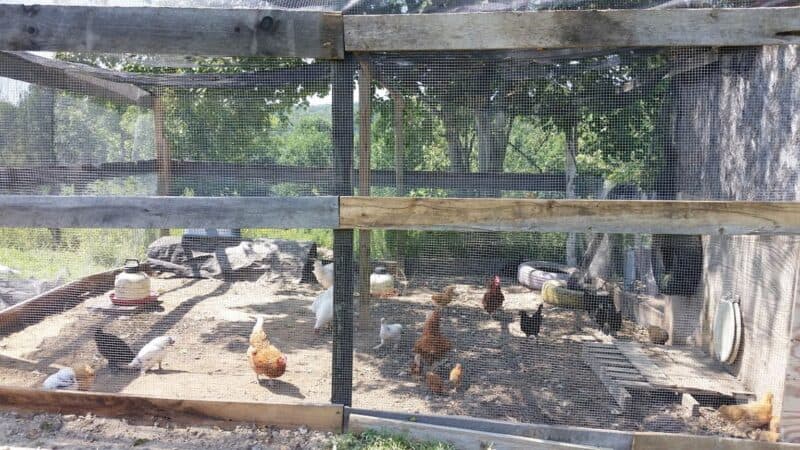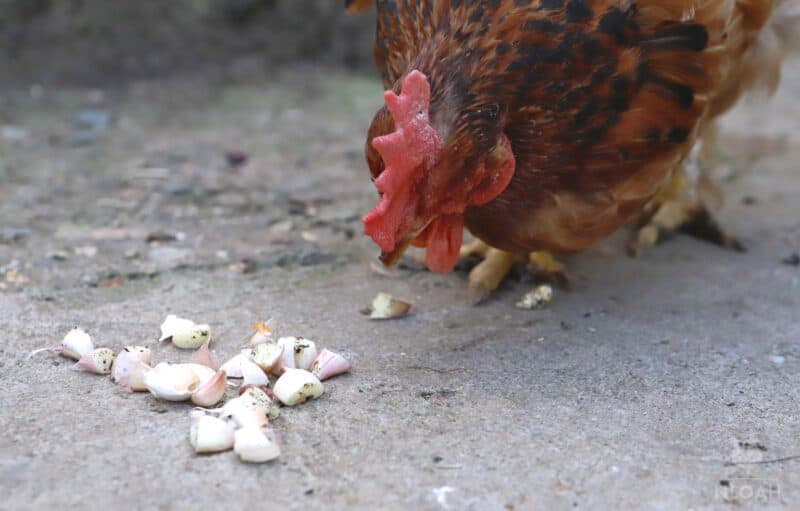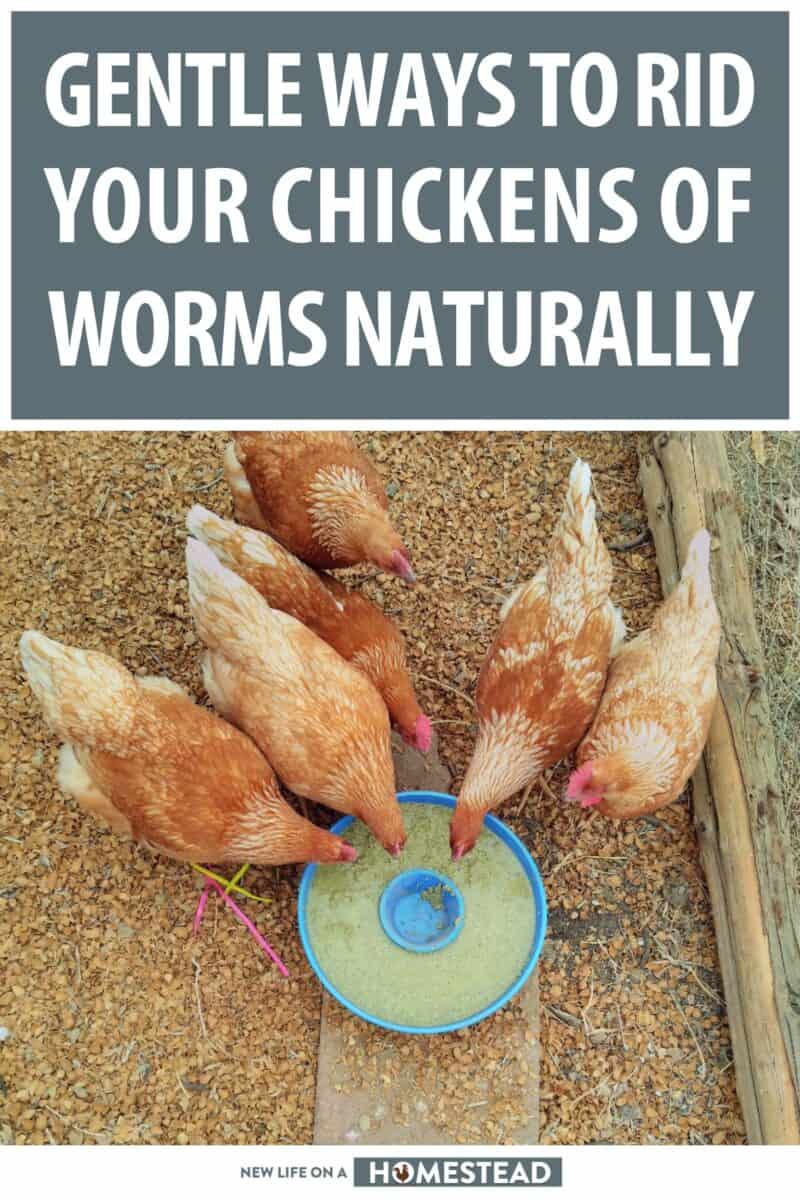There’s one thing that pretty much every living animal on Earth has in common: the fact that at one point or another, it will suffer from some kind of internal parasite. Yes, even our hardy chickens!

Parasites are successful in nature because they’re highly adapted to beating or dodging the host organism’s own immune system, and they then stay inside the host consuming resources and usually weakening or even killing it.
You definitely don’t want this to happen to your chickens, but you can bet they will, at one point or another, contract some sort of intestinal worms.
It’s gross to think about, but the good news is you don’t need to resort to veterinary treatment or specialized medicines when this happens.
There are various proven, all-natural deworming methods that might be just the thing to get these awful critters out of your chickens. I’ll tell you about them below.
Dewormer Solution
I know, I know: I opened this article talking about natural deworming methods and here I am starting off with an over-the-counter dewormer solution!
I promise, I didn’t mislead you, and that’s because we these days we have several proven deworming solutions that are all-natural! They also happen to be fast-acting, easy to administer, and highly convenient…
These products typically work by combining several known botanicals and other all-natural substances that are antagonistic to intestinal parasites of all kinds, including worms.
All you need to do is administer directly to the affected chicken or chickens, and it’s even possible to add some of them to their water supply for ongoing dosing.
Two of the most popular and effective are produced by Backyard Chicken and Verm-X.
Although they cost much more upfront compared to some of the other solutions we’re going to cover in just a moment, the massive increase in convenience and flexibility definitely makes them worthwhile for some keepers.
Also, considering how concentrated these products tend to be, they usually start reading your chickens of worms quicker compared to the other methods that we will discuss, although they still work too!
The only important thing you need to know about these treatments is that you must follow the manufacturer’s instructions to the letter…
Even all-natural products like this can be dangerous or deadly if they are misused or mis-administered. Always read the data sheet that comes with any of these products, and follow them!
Apple Cider Vinegar
If you are a DIY’er, homesteader, or just prefer to use all-natural cleaning products, you’re probably already totally familiar with the next entry on our list.
Apple cider vinegar is well known and greatly beloved, not just for its health benefits and curative properties but also for its germ-killing potential on surfaces in and around your home.
Despite this versatility, it is also a known dewormer used on all sorts of livestock.
It works by essentially changing the environment that these nasty parasites live in, and that environment is the chicken’s digestive tract.
By increasing the acidity of the digestive tract, the worms are encouraged to give up, let go and pass out of the chicken.
And even if they don’t, it can stop the proliferation cycle of parasites by making it difficult or impossible for them to reproduce while in the chicken.
Definitely good benefits, and considering that ACV is generally safe and gentle on chickens, it’s a great product to lead with to see if you can get a handle on minor infestations before they go totally out of control.
However, vinegar is not a normal part of a chicken’s diet! It is very acidic, so paying attention to proper dosing is paramount if you want it to be effective without harming your flock.
The best way to give your chickens apple cider vinegar is actually in their water source. This approach takes time, but it is safe and highly unlikely to cause any discomfort or harm to your chickens.
1 Tbsp. of apple cider vinegar per gallon of water and the water source, administered for a week, is all it should take for you to start seeing noticeable improvement.
Diatomaceous Earth (Food-Grade DE)
Another favorite around the garden and the homestead, diatomaceous earth, typically abbreviated DE for brevity, has long been used for pest control around livestock areas and even directly on livestock.
This stuff, despite the name, is not really dirt but is actually the finely ground shells of ancient, fossilized creatures called diatoms.
Sold in the form of a fine, white or light gray powder, this stuff is surprisingly abrasive, and works to get rid of insects and other parasites by basically lacerating them on a microscopic level, bleeding or drying them out.
It works wonders on fleas, ticks, mites, lice and other bloodsuckers and it can do the same thing to internal parasites, all without harming your chickens.
But for this to work, chickens will have to eat it: You want to make sure you purchase only food grade DE for this purpose, since filter-grade stuff has harmful ingredients in it that your birds should never eat.
As long as you have the food grade DE, simply mix 3 to 4 ounces of the powder into every 2 ½ to 3 pounds of your chicken feed.
Let your chickens eat it as normal, and over the course of a couple of weeks you should be able to test for drastic reductions in parasite numbers.
Deworming Plants for Your Garden
If you really want to go back to basics for deworming your chickens, you can simply add certain common garden plants to their diet. All of the following plants on our list have known and proven deworming properties.
Although they might take longer to work than the methods listed above, they have other benefits in the form of good nutrition and they are the gentlest possible approach for ridding your chickens of worms.
1. Stinging Nettles
Stinging nettles are a major pain if you run into them, but chickens aren’t affected by the burning, blistering toxin and furthermore love eating this notorious but tasty plant.
Aside from being highly nutritious, nettle also has superb anti-parasite properties that can easily flush out worms when it is a regular part of a chicken’s diet.
Simply let your chickens eat the stinging nettle plant several times a week as a regular part of their diet, or harvest it yourself, steep it, and then add the solution to their water.
2. Cucumber Seeds
Cucumber is a refreshing vegetable, but the seeds are also a potent vermifuge, or worm remover.
Even better, chickens tend to love cucumber and they will definitely pick out and eat the seeds if you don’t want to harvest them yourself.
This approach is simplicity itself: simply feed your chickens several handfuls of cucumber seeds daily and then test for the worms as necessary.
After a week, the test should start to clear and in a few weeks they’ll be gone. Make sure you only give your chickens fresh, raw cucumber seeds because cooking them will ruin the effect!
3. Pumpkin Seeds
Pumpkin seeds, like cucumber seeds, are a known vermifuge, and even more effective than cucumber seeds.
Most chickens, similarly, love to eat pumpkin seeds although they might be too big for the smaller breeds of chicken – at least if you have one of the larger varieties of pumpkin!
Once again, just like with the cucumber seeds you want to give them to your chickens daily until the worms are cleared up, and don’t cook the seeds if you want them to work.
Perhaps the only drawback with this method is that you’ll need to make sure the chickens that are actually affected by the worms are actually eating the seeds.

4. Fresh Garlic
One of the oldest, best, and best-known natural cures for intestinal worms and chickens is garlic. Although nominally toxic for chickens, even using it as a treatment for intestinal worms your chickens aren’t going to be getting that much of it.
Garlic is a rippin’ good dewormer because you can administer it to chickens in several different ways as part of their diet. You can grate it up and add it to their food or steep it in their water.
If feeding it to them directly, try to make sure that infested birds get at least one clove worth per day at least 3 days a week. If steeping it to put in their water, place a bunch of peeled cloves and hot, but not boiling, water for 20 minutes. Let it cool, then put it in your chicken water as normal.
Either way, the active compound in garlic is absolutely repulsive to worms and will cause them to be passed from your birds’ digestive tracts.

Tom has lived and worked on farms and homesteads from the Carolinas to Kentucky and beyond. He is passionate about helping people prepare for tough times by embracing lifestyles of self-sufficiency.
